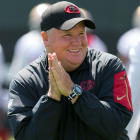Chip Kelly's near-term college job prospects dimmed last week.
Never mind the former Oregon coach may not formally be looking while working in an ESPN studio this season. In a lot of people's minds, Kelly is the best coach not to be on a sideline.
In fact, his name surfaced this week as a possible replacement for Butch Jones at Tennessee.
But if and when he returns to college, Kelly would come with newly defined baggage thanks to the ongoing FBI investigation into college basketball revealed last week.
It has been almost 4½ years since Kelly was sanctioned by the NCAA after he had left for the Philadelphia Eagles. He was slapped with "failure to monitor" in the infamous Will Lyles affair. Even worse, Kelly was handed an 18-month show-cause penalty -- basically in abstentia -- after he went to the NFL.
Oregon was accused of paying $25,000 to Lyles, a shadowy 7-on-7 coach, in exchange for his guiding players to the Ducks. Lyles admitted as much.
That's basically evidence of the same third-party influence Adidas was accused of engaging in by the FBI by paying college basketball assistants to influence players to sign with the shoe giant.
While that sort of college basketball culture has been entrenched for decades, the NCAA is desperately trying to keep it from filtering into football. The Lyles case is the biggest and one of the few public examples that 7-on-7 is becoming the football version of AAU basketball. You know, backroom deals being struck with prospects' handlers, cutting the high school coach further and further out of the loop.
"I look back at it now, and [Oregon] paid for what they saw as my access and influence with recruits," Lyles told Yahoo Sports earlier this decade. "The service I provided went beyond what a scouting service should. … I made a mistake, and I'm big enough of a man to admit I was wrong."
The FBI's college basketball investigation has at least put the fear of God into college athletics. The under-the-table shoe deals have reportedly slowed considerably for the moment.
The fallout, though, awaits. At best, Kelly might be a test case to how scared college administrators are of the FBI banging on their doors. At worst, guys like Kelly -- no matter how talented -- might have problems finding work as a new normal settles over compliance departments.
One FBS compliance director suggested any president considering hiring a coach with a show-cause "go to bat for him. You gotta understand, no matter what you hired him for, he may have restrictions."
Kelly's show-cause expired in late 2014. But the fact that he has such a sanction on his record is troubling in this new normal.
The show-cause is considered the NCAA's scarlet letter. If a school hires a coach saddled with such a label, NCAA penalties can follow the accused to his new place of work.
How that looks for a sitting coach is a bit murkier. Indiana fired basketball coach Kelvin Sampson after he was found to have made improper calls to recruits for a second time. The NCAA rules have since been changed so that sort of conduct wouldn't be a violation today.
Sampson currently coaches at Houston.
Florida Atlantic officials are looking into how such a show-cause penalty might affect defensive coordinator Chris Kiffin's ability to do his job. Lane KIffin's brother has been accused by both Ole Miss and the NCAA of violations during his time with Rebels.
One source said Chris Kiffin has been "forthcoming" when questioned by FAU officials.
Kelly would likely have to face similar questions if and when he got back into college coaching.
In four NFL seasons with two teams, Kelly went 28-35. While a return to the pros doesn't seem imminent, his college coaching rep remains burnished.
















